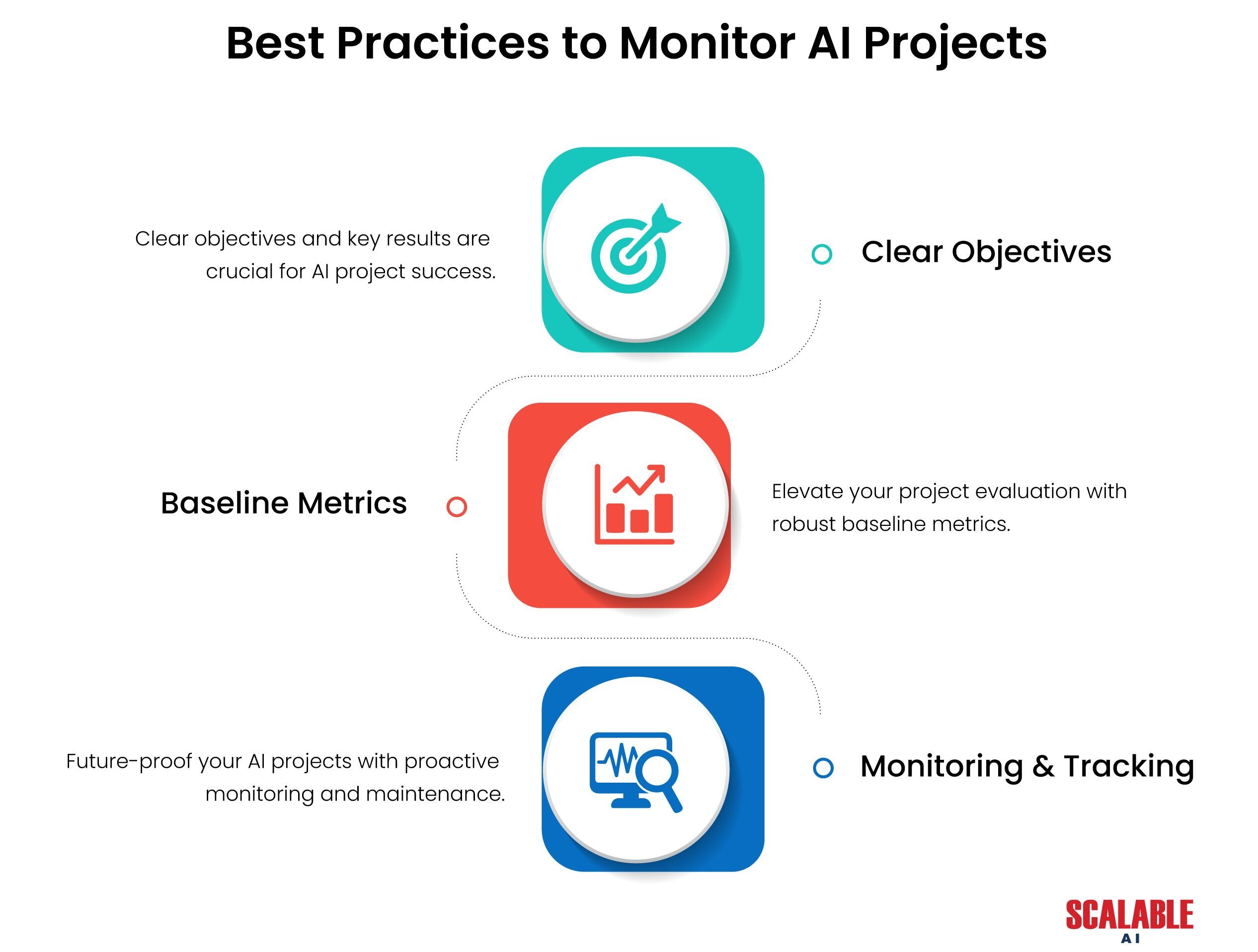Executive Summary :
Proper mechanisms and metrics are essential to gauge an AI initiative’s or implementation’s progress. As organizations pour money and resources into AI technologies, stakeholders need a crystal view of the project’s success. Establishing and implementing precise metrics and key performance indicators (KPIs) helps stakeholders gauge progress and identify fault lines. Defined metrics allow organizations to assess overall performance, identify areas for enhancement, and make informed decisions. However, measuring AI project success isn’t a straightforward approach due to factors like the AI algorithm’s complexity, standardized metrics absence, and fairness considerations. Therefore, organizations must establish clear aims, baseline metrics, and monitoring processes to measure the AI project’s success.
Challenges in measuring AI Project Progress
Assessing the success of AI projects presents several challenges that demand attention. Among these challenges, decision-making stands out. AI systems autonomously make decisions based on intricate algorithms and vast data. However, evaluating the accuracy and reliability of these decisions remains complex. Ensuring transparency, explainability, and bias-free decision-making processes is critical. Furthermore, measuring the impact of AI projects on business outcomes and societal well-being requires thoughtful consideration. Ethical and fairness metrics play a pivotal role in evaluating overall project success. These metrics assess whether AI systems treat individuals fairly and avoid discriminatory practices. Overcoming these challenges is vital to gauge AI project success and ensure ethical and reliable deployment.
Establishing Key Metrics for AI Project Success
Performance Metrics
When assessing the effectiveness of an AI project, accuracy and performance metrics play a pivotal role. The metrics offer insights into the AI model performance and alignment with desired objectives. Automation empowers AI systems to process large datasets swiftly, enabling timely predictions and decisions. By automating tasks, AI projects enhance efficiency and reduce human errors. Furthermore, automation facilitates continuous monitoring, promptly identifying performance issues or deviations. Accuracy and performance metrics, emphasizing automation, are essential for measuring AI project success.
Business Viability Metrics
Business impact metrics play a pivotal role in gauging the success of an AI project. These metrics assess the tangible benefits that the project delivers to the organization. They specifically focus on Artificial Intelligence’s positive outcomes and advantages, including cost savings, revenue generation, process efficiency, customer satisfaction, and competitive edge. Standard business impact metrics include key aspects like return on investment (ROI), customer acquisition cost (CAC), customer lifetime value (CLTV), and market share. By diligently tracking and analyzing metrics, organizations can get an idea about the overall effectiveness of their AI initiatives and make informed decisions to optimize overall business outcomes.
Ethical and biased metrics
Organizations must assess potential biases in AI algorithms and incorporate ethical and fairness metrics in the evaluation process. This ensures that AI projects align with societal values and avoid harm. For example, measuring the fairness of targeted advertising algorithms is crucial to prevent discriminatory practices in marketing.
Best Practices to track and monitor AI Project Success

Define clear objectives
One of the best practices for assessing AI project success is establishing clear objectives and key results (OKRs). This involves defining specific and measurable goals aligning with the project’s objectives. Clear objectives serve as benchmarks, helping determine desired outcomes and providing a framework for evaluating AI project success. Meanwhile, key results represent quantifiable metrics that track progress toward achieving those objectives. Stakeholders can evaluate AI project performance by outlining precise objectives, monitoring key results, and making data-driven decisions for continuous improvement.
Establishing Baseline Metrics
Setting baseline metrics is a critical step in evaluating the success of any project, be it a traditional or an AI one. The metrics are a benchmark against which the organization can assess project performance and impact. They act as a reference point for gauging the effectiveness of AI applications and determining whether they align with desired objectives. Organizations can monitor their AI projects’ progress by establishing baseline metrics and pinpoint improvement areas. This approach also facilitates performance comparison across different models or algorithms, enabling informed decisions for optimizing AI systems. Moreover, baseline metrics allow organizations to measure their AI initiatives’ return on investment (ROI) and justify resource allocation. Establishing baseline metrics is essential for ensuring the success and effectiveness of AI projects.
Constant Monitoring & Tracking
To ensure a successful AI project, constant tracking is vital. It means continuously monitoring how well the system performs and how accurate it is. This vigilance allows us to catch any problems that pop up and fix them quickly. On top of that, there is a need to evaluate the impact AI has on business activities regularly. Stakeholders can see if the AI delivers the desired outcomes by checking metrics tied to the project’s goals. But that’s not all. Constant monitoring and evaluation ensure that AI is used ethically and fairly. This way, enterprises can identify and address any biases or unfairness that might be present, keeping things transparent and accountable.
Conclusion
Evaluating the success of AI initiatives is essential for understanding their effectiveness and impact. Companies can unlock valuable insights into their AI projects by assessing key performance indicators. Methodical evaluation helps identify areas for enhancement, supports informed decision-making, and aids in refining AI models and algorithms. With the growing prevalence of AI applications in the business sector, it has become increasingly critical to accurately assess the outcomes of these projects. Nonetheless, gauging the success of AI endeavors presents challenges due to AI technologies’ complexity and varied dimensions. It necessitates the adoption of suitable metrics that reflect various facets of AI effectiveness, including accuracy, contribution to business goals, and adherence to ethical standards. By meticulously measuring the success of their AI projects, organizations can ensure these initiatives align with their strategic ambitions, thereby fostering beneficial results.
Read Whitepaper AI Project Success: Demystifying the Path to Breakthroughs
